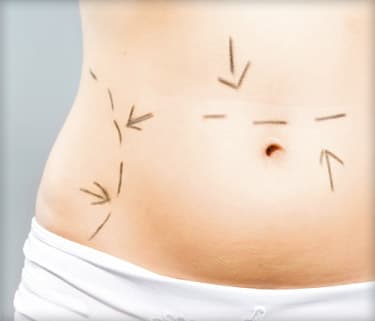Liposuction is an option to remove small bulges of fat that diet and exercise don't budge and to improve your body's shape. It's most commonly done on the hips, abdomen, thighs, buttocks, and face. Liposuction does not remove cellulite, only fat.
Who Is a Good Candidate for Liposuction?
A good candidate for liposuction should have realistic expectations about the results of the procedure. In addition, he or she should:
- Be of average or only slightly above-average weight
- Have firm, elastic skin
- Be in good overall health
- Have concentrated pockets of fat that do not respond well to diet and exercise
People with cellulite are not good candidates for liposuction because they may develop skin irregularities in the treated area.
Age is generally not a major consideration when discussing liposuction. Older adults, though, often have less elasticity in their skin and thus may not get the same results that a younger person with tighter skin might get.
What Do I Need To Know Before Undergoing Liposuction?
The first step is to consult with your surgeon. During the consultation, you'll discuss your goals, the options, the risks and benefits, and the costs. Be sure to ask the surgeon any questions you may have.
If you decide to go ahead with liposuction, your surgeon will give you instructions on how to prepare for the surgery. This may include dietary guidelines, alcohol restrictions, or taking or avoiding certain vitamins.
Tell your surgeon of any allergies you have and any medications you are taking. This includes over-the-counter and prescription medications as well as herbal supplements. Your surgeon needs that information to make sure you'll be safe during surgery.
How Is Liposuction Done?
Depending on the type of liposuction you are having, you may be able to have it done at a doctor's office or surgery center and go home the same day. If large amounts of fat will be removed, the procedure will be done in a hospital, and you may need to stay overnight.
Before the procedure starts, you will be given an anesthetic. Depending on how much fat is being removed and the type of liposuction being done, you may get local anesthesia or general anesthesia. With general anesthesia, you will be "asleep" during the procedure.
Once the anesthesia has taken effect, the surgeon will make small cuts, insert a suction device inside the cut, and remove excess fat using a suction pump or a large syringe. How long it takes depends on how much fat is being removed.
 Types of Liposuction
Types of Liposuction
There are a couple of different liposuction techniques:
- Tumescent liposuction. With this technique, the surgeon will inject a solution into your fatty areas before the fat is removed. It is made up of a saline solution, a mild painkiller, and epinephrine -- a drug that contracts your blood vessels. The solution helps the surgeon remove the fat more easily, helps reduce blood loss, and eases pain during and after surgery.
- Ultrasound-assisted liposuction. With ultrasound-assisted liposuction, ultrasonic energy is used to liquefy the fat, which is then removed from your body.
How Long Does Recovery Take?
When liposuction is an outpatient procedure, people usually recover quickly. Most people can return to work within a few days and get back to normal activities within two weeks.You should expect bruising, swelling, and soreness for at least a few weeks. Your surgeon may require you to wear a compressive garment for one to two months after surgery to control swelling.However, every person is different. Your doctor will discuss what results you can expect to achieve and how to best maintain your new body shape.Are the Results Permanent?
The fat cells are removed permanently during liposuction. If you gain weight after the procedure, it usually will not concentrate in the area that was treated.However, it is important to note that liposuction will not prevent you from gaining weight. To keep your new shape and new weight after liposuction, you must follow a proper diet and exercise plan.What Are the Risks of Liposuction?
All surgery has some risk. Liposuction has a good safety record and its risks are minimized when done by a specially trained, board-certified plastic surgeon.Although rare, risks include infection and skin discoloration. The risk of medical problems can be minimized by avoiding extremely long procedures or excessive fat removal.Because it is a cosmetic procedure, liposuction is not covered by most health insurance plans. Talk to your health insurance company and your surgeon about the costs and payment options.



I live in Utah and liposuction here is pretty reasonable in terms of costs. Insurance will usually not cover this procedure but most places will set you up on a payment plan.
ReplyDeletecontent of this blog is excellent, for more information about liposuction visit alluremedspa
ReplyDeleteHi excellent blog post. I really appreciates with your Post,thanks for sharing such valuable Information about Liposuction.
ReplyDelete